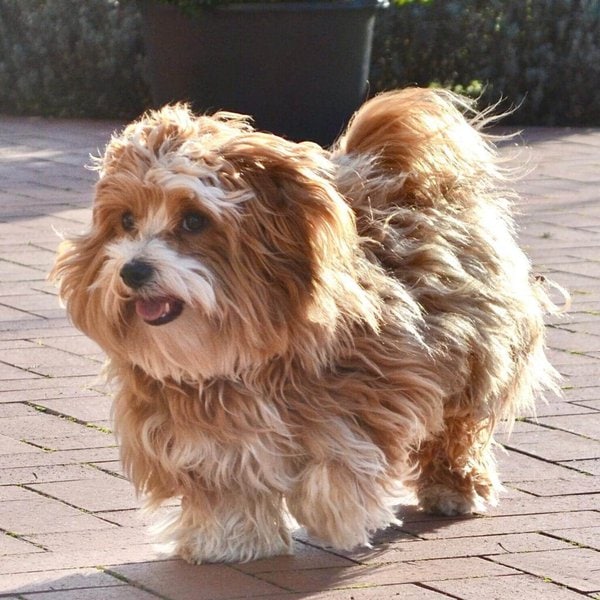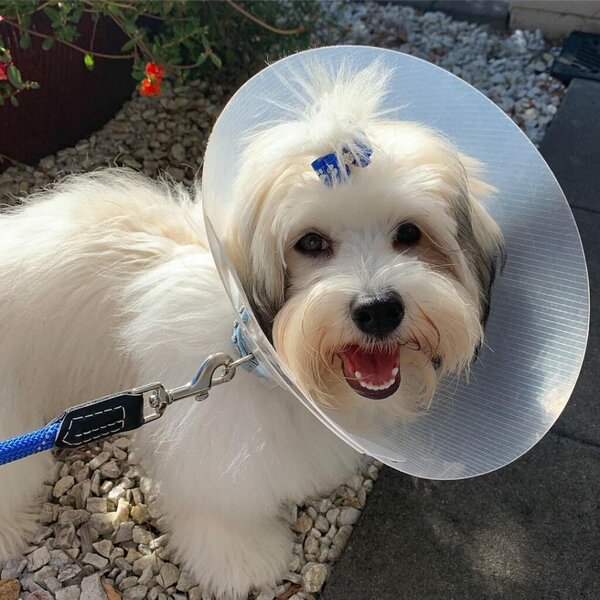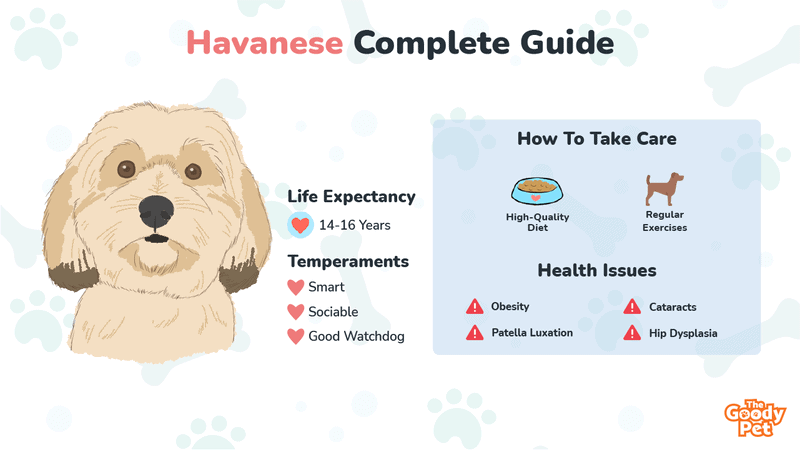I’ve never considered owning a long-haired dog because, in my thinking, they come with an extra grooming chore. But this approach changed the first time I met a Havanese dog, and now I own one. The original Cuban national dog does not only look adorable with long hair, but this furry pup also has a personality that would make anyone fall in love with them.
Havanese are good for first-time dog owners because they have a lovable personality. Their tiny size comes with a lower owning cost, and you need less time to groom their long hair than if you had a larger long-haired dog. Havanese dogs also have fewer exercise needs and are generally a healthy breed.
Of course, you’ll need to take good care of your Havanese pup to ensure they live fully their relatively long lifespan. We’ll tell you everything about taking care of a Havanese and why you should consider a Havanese for a first dog.
Is A Havanese A Good First Dog?
If you are a first-time dog owner, you should know that the Havanese is an excellent choice if you are willing to dedicate time to them. Havanese dogs have plenty of qualities that make them great first dogs.
Havanese Dogs Are Just The Right Size For A Family Pet
Havanese are a toy breed. They will grow up to a height of between 8.5 to 11.5 inches and weigh between 7 to 13 lbs. Owning a small dog comes with its advantages:
- You need less space.
- You can handle a Havanese more easily on a leash.
- You can easily pick up your tiny new pet.
- You have less trouble grooming a tiny dog.
- The cost of owning a smaller dog is a lot less.

Havanese Dogs Are Charming In Appearance And Personality
There are 25 colors and 8 patterns of the Havanese breed listed by the AKC. So, you can choose the color of your Havanese from a range of beautiful coat colors, including black, white, fawn, blue brindle, and Irish Pied, among others.
What’s more, you’ll enjoy the pleasant personality of the vivacious, funny, intelligent, and sociable Havanese.
Havanese Dogs Have Average Energy And Exercise Needs
Your Havanese pup will enjoy a brisk walk or a short hike, as long as you don’t insist once your dog starts panting.
Even though they didn’t have the energy of hound dogs and were bred for companionship, Havanese were considered good circus dogs in many European countries. They have the energy for a good playtime with you in the backyard or around the house.
Havanese Dogs Also Have Some Limits
Besides these great qualities, Havanese dogs can be stubborn, difficult to housebreak, and are not good at being left alone for long, as we shall tell you later.
How Long Do Havanese Dogs Live?
Havanese have a relatively long lifespan and are assigned 14 to 16 years of life. But how long your Havanese lives will depend on the level of care given to your dog and how healthy its life is.
If you own a Havanese, you should know about the following care and health issues that can affect your dog’s life expectancy.

Havanese Dogs Can Be Prone To Obesity
According to the AKC, Havanese dogs can be prone to obesity. As such, you should feed your furry friend with high-quality food, as we’ll be telling you later.
While 8 to 13 lbs is the standard healthy weight for Havanese, some adult Havanese may grow up to 20 lbs.
However, if your Havanese dog is gaining weight beyond this and tending to the 30-pound mark, you should consider your dog to be overweight and take the necessary precautions as being overweight comes with related health issues.
Beware Of Havanese Breed Health Issues
The Havanese Club of America indicates that Havanese dogs are generally healthy with no prevalent single disease or malady.
Nonetheless, Havanese dogs can be prone to hereditary and genetic breed-related health issues, including the following:
- Eye problems (cataracts and cherry eye)
- Stature and joint problems such as Hip Dysplasia, Patellar Luxation, Legg-Calve-Perthes, and Chondrodysplasia (research has shown that foreleg abnormalities are common in Havanese dogs)
- Deafness
- Liver shunt
- Skin problems (a study among Havanese dogs showed that Sebaceous Adenitis was a common diagnosis in Havanese dogs affecting mostly the ears)
To ensure your Havanese is protected from these hereditary and genetic health issues, buy your puppy from a reliable breeder and have your dog undergo the Orthopedic Foundation for Animals (OFA) breed-specific health tests: annual eye and hearing test exams, hip X-ray, and patella (knee) certification.
How To Take Care Of Havanese Dogs?
Bringing home a Havanese puppy couples the joy of owning a lovely pet with the duty of taking good care of your dog. There are two key areas of care for your Havanese: nutrition and exercise.
How Much Food Should A Havanese Eat Per Day?
The general rule is that you should feed your dog twice a day. But, as for how much food your dog should eat, that depends on a number of factors, including:
- Age
- Breed
- Dog size
- Exercise level
If you are feeding your Havanese with dry food, the best way to determine how much you should give is by checking the feeding chart on the food packaging.
For example, the Purina brand suggests that dogs between 3 to 20 lbs should eat between ⅓ and 1 cup daily, which falls within the healthy range for a Havanese.
Note too that fresh dog food is becoming a more popular alternative to wet canned or dry kibble dog food. If you go for this option, we recommend Pet Plate.
Their meals are made with human-grade ingredients and cooked with the highest safety standards. Besides, it is grain-free and rich in protein. Any picky eater will love the taste of Pet plate choices.
If your dog has digestive issues, Multivitamin Treats Supplement – Zesty Paws Probiotics will help the pup digest their food with ease and aid in nutrient absorption, thereby improving their immune system.
How Much Exercise Does A Havanese Require Daily?
Havanese are medium-energy dogs and will do well with 30 minutes of exercise daily. This could mean a few short walks (one mile) during the week plus indoor or backyard daily play. Havanese are also not your fastest running dogs and can reach speeds of 10 to 15 mph for a few minutes.
If you are short of time to spend with your dog, you can also engage an automatic toy to entertain your pup. The iFetch Interactive Ball Launchers For Dogs is perfect for toy dogs like the Havanese.
With the three tennis balls in the automatic launcher, you can initiate your pup on the fetch game with the possibility of adjusting the launch distance to suit your space and your dog’s ability.
Other General Havanese Care Practices
Havanese dogs love to sleep and can sleep for 12 to 14 or more hours every day, especially during puppyhood.
A Havanese will hold their bladder overnight by the age of one. Before then, you can determine how long your dog can hold the bladder by adding one to his age and make it a routine to walk your dog after that number of hours.
How Long Can You Leave A Havanese Alone? Temperaments Of Havanese Dogs
As a Havanese owner, one of your responsibilities will be to train your dog to be a good family pet and a sociable dog. This is made easy by the fact that the Havanese is a smart dog with an average rank on working and obedience intelligence on Stanley Coren’s list.
However, you’ll need to know how to capitalize on your dog’s best traits and manage any challenges to make the training successful.

Havanese Dogs Are Generally Easy To Train
Havanese are playful, friendly, sweet, intelligent, and alert, which makes them good pets and trainable dogs. Even though they can try to have their way and show stubbornness, the Havanese love to please. They are not aggressive unless training and socialization have not been done right and on time.
The trick for good training is to start early and be consistent. Avoid allowing your Havanese dog’s cuteness to melt your heart and get away with bad behavior.
For example, if your Havanese has the habit of biting, you should teach self-control as over-excitement is the number one reason for biting. But your dog will generally calm down by two years of age if it has biting or barking habits.
Havanese can also be slower to potty training. So, it is important to teach your pup where and when. You could do so by always bringing your pup to the same spot and around the same time when they have to ease themselves.
Havanese Are Good But Quiet Watchdogs
Unlike most dogs that are good watchdogs, Havanese dogs are pretty quiet dogs and are not excessive barkers.
If your Havanese tends to bark a lot, you should find out why. It could be that you don’t give them your time and they are lonely and bored. A little more attention and obedience training will stop them from barking.
Watch Your Havanese For Separation Anxiety
As the friendly and warm dogs that they are, Havanese can suffer from separation anxiety if they are left alone for long. Not all Havanese suffer from separation anxiety. So, if yours does, know that you are leaving them alone too long.
You can avoid leaving your Havanese alone by hiring a dog sitter or purchasing a dog camera to stay connected with your pup.
Are Havanese Dogs Hypoallergenic? Grooming Tips For Havanese Dogs
The Havanese coat has a naturally long, soft, and silky appearance.
Some Havanese owners keep their pup’s hair corded, while others prefer to keep it short. Whichever your choice, there are some basic things you should know about Havanese hair and grooming needs.
Havanese Dogs Are Hypoallergenic
Havanese have hair, not fur. Though both fur and hair are the same in substance, their growth process is different.
Hair looks and feels smoother, is longer, and grows in a single layer, and in a longer growth cycle. This makes it fall less, which is why the Havanese is hypoallergenic. Even if you keep your Havanese hair short, the shedding will still be minimal.
Havanese Are High Maintenance Dogs
The long Havanese hair needs daily brushing to keep it from tangling and matting. For this reason, and because of their other grooming needs, the Havanese is considered a high-maintenance dog.
The daily brushing of the Havanese hair can be aided by a good brush. The Furminator Undercoat Tool is a good choice. It will get rid of loose hair from both the undercoat and the overcoat without hurting your dog’s skin. You can then release the hair from the comb by simply pushing a button.
Pairing the Furminator with the iRobot Roomba i3+ will help you get rid of any hair lying around your home.
This robot vacuum will take vacuuming off your mind for months. You won’t even need to empty it. The robot traps 99% of pollen and mold, and you can use Alexa to control when your robot vacuums.
Other Havanese Grooming Needs
Bathing your Havanese dog should be occasional or at an opportune moment if there is a need to do so. Since Havanese are prone to skin issues, as mentioned earlier, a good shampoo should be used.
Consider the Pro Pet Works All Natural Organic 5 In One Oatmeal Pet Shampoo + Conditioner, which is formulated for sensitive skin and facilitates easy brushing. It is safe for frequent use and is enriched with Aloe Vera and Almond oil.
Keep your Havanese puppy’s nails short to avoid uncomfortable walking, and wipe their eyes and ears daily with moistened gauze to discourage infections.
Related Questions
How Much Should I Expect To Pay For A Havanese Puppy? The average price of a Havanese is around $1,500. Depending on the breeder, expect to pay as low as $700 for a Havanese from puppy brokers and as high as $3,500 from reputable breeders like those registered with the AKC. As with other breeds, these prices could change depending on additional factors like location, gender, and age, among others.
Can Havanese Swim? Yes, Havanese dogs can swim, but they have to be taught how to. If you are lucky, your Havanese may have a natural liking for swimming and learning fast. But some Havanese dogs could require more time to learn to swim, and you should keep an eye on your tiny furry friend while they learn to be in the water safely.
Do Havanese Need Another Dog? Because of their playful and friendly nature, Havanese dogs need the company of their owners and family or another dog. They’ll get along well with other dogs and even better with other Havanese dogs. For this reason, they are often listed among dog breeds that get along with dogs of a different breed.





